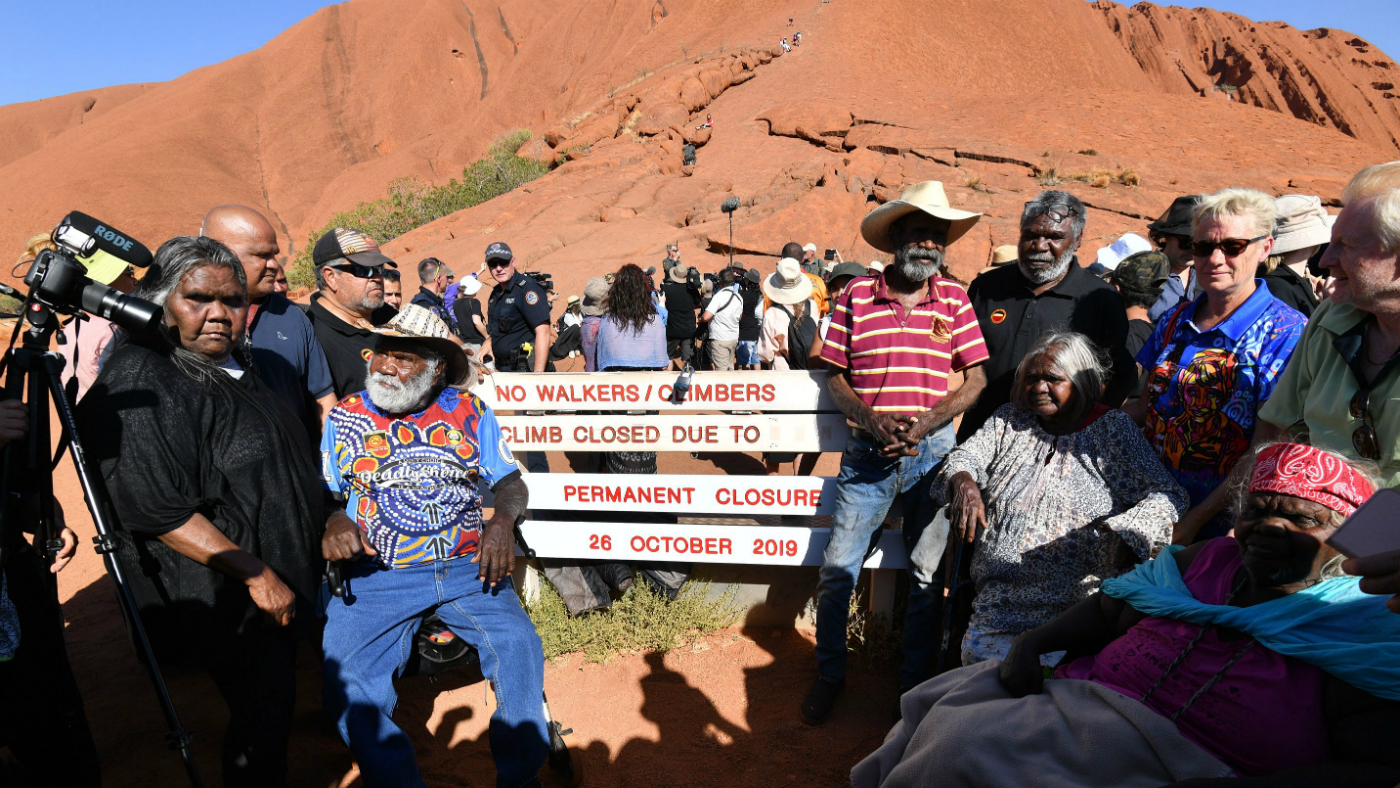Why people are banned from climbing Uluru
The world-famous monolith holds spiritual significance in local Aboriginal culture

A free daily email with the biggest news stories of the day – and the best features from TheWeek.com
You are now subscribed
Your newsletter sign-up was successful
A ban on climbing Uluru, the world-famous landmark in the Australian outback, comes into effect this weekend, prompting hundreds of tourists to flock to the holy site on Friday for the last chance to scale the rock.
Uluru, also known by its English-language name Ayers Rock, is a 550 million-year-old sandstone monolith that has long been a sacred site of the Pitjantjatjara or Anangu, the Aboriginal people of the area.
As a result of its significance in Anangu culture, members of the indigenous group have called for the monolith to be closed to climbers since 1985, when the park was returned to indigenous control. Last year, more than 370,000 people visited Uluru, with around 13% of those who visited during that period making the climb, park authorities said.
The Week
Escape your echo chamber. Get the facts behind the news, plus analysis from multiple perspectives.

Sign up for The Week's Free Newsletters
From our morning news briefing to a weekly Good News Newsletter, get the best of The Week delivered directly to your inbox.
From our morning news briefing to a weekly Good News Newsletter, get the best of The Week delivered directly to your inbox.
The Anangu say that Uluru has deep spiritual importance as a route their ancestors took.
“This is our Tjukurpa [our cultural inheritance], our law and our stories, from long ago,” said Sammy Wilson, a member of the board of joint management of the Uluru Kata Tjuta National Park. “It is an extremely important place, not a playground or theme park like Disneyland,” Al Jazeera reports.
Australia’s Indigenous Affairs Minister Ken Wyatt added that tourists flocking to Uluru is akin to “a rush of people wanting to climb over the Australian War Memorial”.
“Our sacred objects, community by community, are absolutely important in the story and the history of that nation of people,” he said on AFP.
A free daily email with the biggest news stories of the day – and the best features from TheWeek.com
After the National Park’s board voted unanimously in November 2017 to bring an end to climbing at the site, Australian officials announced that an official ban would take effect on 26 October 2019 - this Saturday - prompting thousands of visitors to flock to the site in the months before its closure.
On Friday, the final day of opening, the climb opened to visitors three hours later than its usual time of 7am after park rangers “deemed it was too dangerous because of high winds”, says Al Jazeera. The last chance to climb the rock was at 4pm on Friday.
The implementation of the ban has come as a relief to local Anangu people. “The burden will be lifted as of today. I can feel it,” Donald Fraser, a local elder, told the BBC. “Now is the time for the climb to have a good rest and heal up.”
-
 Wuthering Heights: ‘wildly fun’ reinvention of the classic novel lacks depth
Wuthering Heights: ‘wildly fun’ reinvention of the classic novel lacks depthTalking Point Emerald Fennell splits the critics with her sizzling spin on Emily Brontë’s gothic tale
-
 Why the Bangladesh election is one to watch
Why the Bangladesh election is one to watchThe Explainer Opposition party has claimed the void left by Sheikh Hasina’s Awami League but Islamist party could yet have a say
-
 The world’s most romantic hotels
The world’s most romantic hotelsThe Week Recommends Treetop hideaways, secluded villas and a woodland cabin – perfect settings for Valentine’s Day
-
 Epstein files topple law CEO, roil UK government
Epstein files topple law CEO, roil UK governmentSpeed Read Peter Mandelson, Britain’s former ambassador to the US, is caught up in the scandal
-
 Iran and US prepare to meet after skirmishes
Iran and US prepare to meet after skirmishesSpeed Read The incident comes amid heightened tensions in the Middle East
-
 Israel retrieves final hostage’s body from Gaza
Israel retrieves final hostage’s body from GazaSpeed Read The 24-year-old police officer was killed during the initial Hamas attack
-
 China’s Xi targets top general in growing purge
China’s Xi targets top general in growing purgeSpeed Read Zhang Youxia is being investigated over ‘grave violations’ of the law
-
 Panama and Canada are negotiating over a crucial copper mine
Panama and Canada are negotiating over a crucial copper mineIn the Spotlight Panama is set to make a final decision on the mine this summer
-
 Why Greenland’s natural resources are nearly impossible to mine
Why Greenland’s natural resources are nearly impossible to mineThe Explainer The country’s natural landscape makes the task extremely difficult
-
 Iran cuts internet as protests escalate
Iran cuts internet as protests escalateSpeed Reada Government buildings across the country have been set on fire
-
 US nabs ‘shadow’ tanker claimed by Russia
US nabs ‘shadow’ tanker claimed by RussiaSpeed Read The ship was one of two vessels seized by the US military